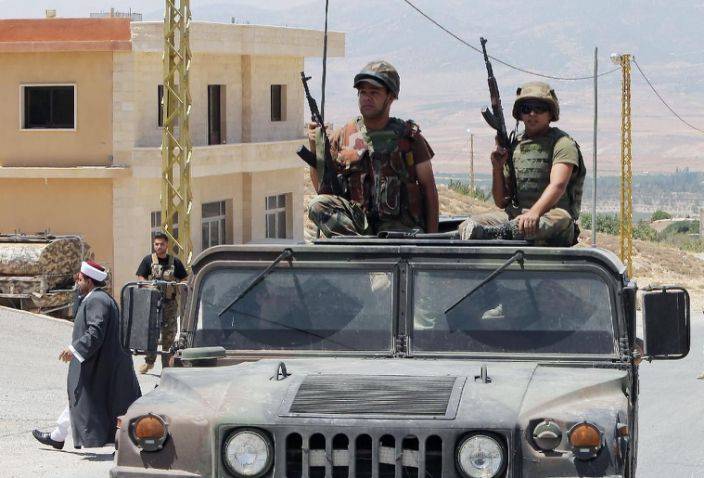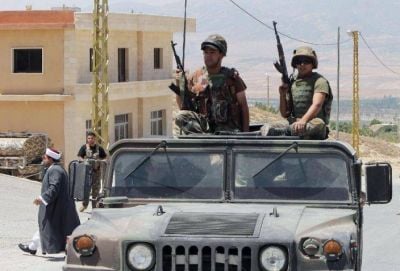
Lebanese soldiers patrol the village of Arsal, in the Bekaa, in 2014. (Credit: Joseph Eid/AFP File)
BEIRUT — Following Wednesday's explosion that killed five people near the Syrian border, which killed five people, the Popular Front for the Liberation of Palestine-General Command (PFLP-GC) was quick to blame Israel.
The explosion took place near the base of the PFLP-GC in Koussaya, in the Bekaa Valley. A Lebanese security source told AFP on Wednesday that the base is an arms depot. Israel denied any involvement.
A Lebanese Army source told L'Orient-Le Jour that he believes the explosion was an accident. So is Israeli involvement even plausible? Khalil Helou, a retired army officer and vice president of Liban Message, weighs in.
The PFLP-CG blamed Israel for the explosion. Is this plausible?
Given that it's an arms depot or a secure warehouse, it's hardly Israel. If there was no sighting of aircraft and if the place is at least fortified, it seems unlikely to me [that Israel was involved]. Besides, it doesn't look at all like an Israeli tactic. Tel Aviv generally favors two types of operations: either precision missiles fired from the air or surface-to-surface missiles — as they often do to target Syria — or they deploy lethal weapons fitted to aircraft, which can fire a kind of precision laser beam. But these weapons cannot pierce large structures, and the Israeli army claims it has not yet equipped its aircraft with this type of weapon.
Is it more likely that the explosion was an accident?
There must have been some [equipment] mishandling on their part in the base. A rocket can't explode like that, in the middle of nowhere, in a secure warehouse if its detonator hasn't been triggered. They must have incorrectly transported the rocket in question. Blaming Israel directly is the PFLP-GC's typical reaction ... Unless Israel has reached an unprecedented and, hitherto, unheard-of military level to the point of breaking through the walls, which seems unlikely, [then they were not likely involved].
Have these kinds of explosions happened before in the region?
Of course. There have been all kinds of mysterious explosions. But Koussaya is a fortified area, a secure hill hollowed out like Swiss cheese. As far as I know, there are weapons there but the base seems inactive. The base is more than 40 years old, and it's an arms transit point between Lebanon and Syria.
So there's no justification for a possible Israeli operation?
Absolutely not! They have no reason to do so. Israel usually acts in retaliation to an attack or in revenge for any act previously committed by similar groups. What's more, Israel has no interest in targeting the PFLP-GC; this group has nothing to do with either Hamas or the Islamic Jihad. They are linked to the Syrian regime, with which Tel Aviv has had fewer problems of late.
It's true that the PFLP-GC gave birth to Hezbollah, as several of its leaders have their origins in the PFLP-GC. But today, they no longer have any link with each other and are just allies on paper — "comrades in Resistance."
Is it likely that the PFLP-GC will retaliate?
I don't think they'll risk it. They know that, if they retaliate without a proven and verified reason, Israel won't hesitate to strike them directly. They are not Hezbollah, and they represent no major stake for Israel.
